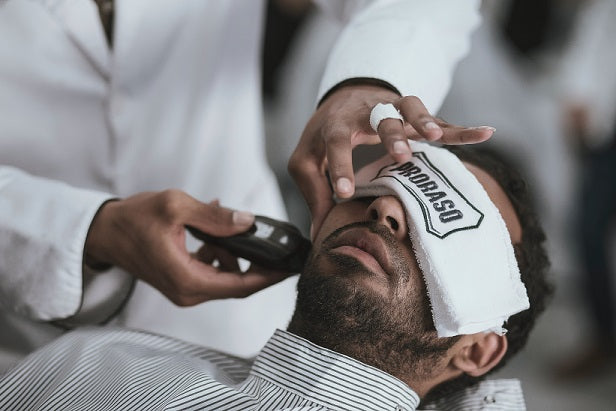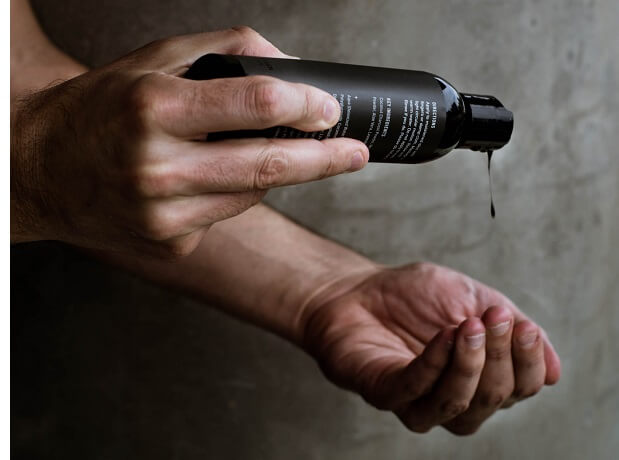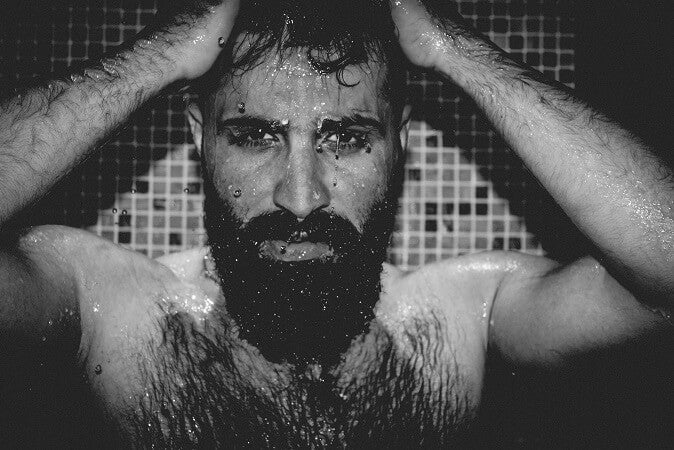FAQ: Manscaping Arms and Armpits
-
Q: How often should I manscape my armpits?
A: The frequency depends on personal preference and hair growth rate, but typically every 3-7 days is sufficient for most men. -
Q: Will shaving my armpits make me sweat more?
A: No, shaving doesn't affect sweat production. It may initially feel different due to increased skin sensitivity. -
Q: Can manscaping reduce armpit irritation?
A: Yes, it can reduce irritation caused by friction from hair, especially during physical activities.
When it comes to manscaping arms and armpits, individuals often wonder about the impact on body odor. The question arises: does shaving armpits actually reduce smell? In this comprehensive exploration, we delve into the benefits of manscaping arms and armpits and its potential influence on body odor to uncover the truth behind this grooming practice. We'll also examine the cultural and historical aspects of armpit grooming, as well as the latest trends in manscaping.
The Relationship Between Armpit Hair and Body Odor
Armpit hair serves as a natural habitat for bacteria, and when combined with sweat, it can contribute to body odor. The bacteria present on the skin break down the proteins in sweat, producing an unpleasant odor. While body odor is a natural occurrence, some individuals explore manscaping their arms and armpits as a means to manage and potentially reduce odor.
It's important to note that the relationship between armpit hair and body odor is complex. While hair can trap bacteria and sweat, it also serves some biological functions:
- Temperature regulation: Armpit hair can help in cooling the body by wicking sweat away from the skin.
- Friction reduction: It can reduce friction between the upper arm and torso during movement.
- Pheromone dispersal: Some theories suggest that armpit hair may play a role in dispersing pheromones, although this is still debated in scientific circles.
The Benefits of Shaving Armpits
Shaving armpits can offer several benefits, including:
1. Reduced Bacterial Presence
Manscaping armpits involves removing or trimming armpit hair, which can lead to a reduction in the bacterial population. With fewer bacteria present, the breakdown of sweat proteins is minimized, potentially resulting in decreased body odor. This effect can be particularly noticeable in individuals who struggle with excessive body odor.
2. Enhanced Hygiene
Shaving promotes better hygiene as it allows for easier cleansing of the armpit area. Removing excess hair makes it simpler to apply and spread hygiene products, such as deodorants and antiperspirants, directly onto the skin. This can lead to more effective odor control and a fresher feeling throughout the day.
3. Improved Air Circulation
Reducing the density of armpit hair can enhance air circulation to the skin, aiding in the evaporation of sweat. This improved airflow can contribute to a drier environment, making it less conducive for the proliferation of odor-causing bacteria. Better air circulation can also help in keeping the armpit area cooler, which may be beneficial during hot weather or physical activities.
4. Aesthetic Appeal
Many individuals find that manscaped armpits are more visually appealing. This can boost confidence, especially when wearing sleeveless clothing or during intimate situations. The aesthetic aspect of manscaping has gained popularity in recent years, with many celebrities and athletes openly embracing the practice.
5. Reduced Staining on Clothes
Shaved armpits may lead to less staining on clothes. Armpit hair can trap sweat and deodorant, which can then transfer to clothing, causing unsightly stains. By removing or reducing hair, this issue can be minimized, potentially extending the life of your garments.
The Science Behind Body Odor
To understand the potential impact of manscaping armpits on body odor, it's essential to consider the science behind the phenomenon:
-
Sweat Composition: Sweat itself is virtually odorless. The characteristic smell associated with body odor arises when bacteria break down the proteins and fatty acids in sweat. There are two types of sweat glands in the armpit area:
- Eccrine glands: Produce watery sweat to cool the body
- Apocrine glands: Produce a thicker, protein-rich sweat that bacteria love to feed on
- Bacterial Activity: Bacteria thrive in warm, moist environments. Armpit hair provides an ideal habitat for bacteria, facilitating the breakdown of sweat components and the production of odor. The most common bacteria found in armpits are Staphylococcus, Corynebacterium, and Propionibacterium.
-
Personal Factors: Individual variations, including genetics, diet, and overall health, play a role in determining the intensity and type of body odor produced. Some factors that can influence body odor include:
- Hormonal changes
- Certain foods (e.g., garlic, onions, spicy foods)
- Medications
- Medical conditions (e.g., hyperhidrosis)
Does Shaving Armpits Reduce Smell?
The impact of manscaping armpits on reducing smell is subjective and varies from person to person. While shaving may lead to a decrease in bacterial presence and enhanced hygiene, it is not a guaranteed solution for eliminating body odor entirely.
Several studies have attempted to quantify the effect of armpit hair on body odor:
- A 2016 study published in the Journal of Cosmetic Dermatology found that men who removed their armpit hair experienced a significant reduction in axillary odor over a 24-hour period compared to those who didn't.
- However, a 2012 study in Behavioral Ecology and Sociobiology suggested that armpit hair might actually help reduce body odor by wicking sweat away from the skin, preventing bacterial growth.
These conflicting results highlight the complexity of the issue and the need for more research in this area.
Individuals are encouraged to explore different grooming practices and hygiene routines to find what works best for them. Factors such as personal preferences, skin sensitivity, and lifestyle choices all contribute to the decision-making process.
How to Shave Armpits Safely
For those considering manscaping their armpits, here are some safety tips to ensure a comfortable and irritation-free experience:
- Start with Trimming: If the armpit hair is long, consider trimming it first to make the shaving process more manageable. This can be done with scissors or an electric trimmer.
- Cleanse the Area: Wash your armpits thoroughly with warm water and a gentle soap to remove any dirt, sweat, or deodorant residue.
- Exfoliate: Gently exfoliate the area to remove dead skin cells and help prevent ingrown hairs.
- Use Shaving Cream or Gel: Apply a quality shaving cream or gel to lubricate the skin and soften the hair, making it easier to shave.
- Use a Clean Razor: Use a sharp, clean razor to minimize the risk of nicks and irritation. Consider using a razor specifically designed for body grooming.
- Shave in the Right Direction: Start by shaving in the direction of hair growth to reduce irritation. For a closer shave, you can then go against the grain, but be gentle to avoid razor burn.
- Rinse Frequently: Rinse the razor often during shaving to prevent clogging and ensure a clean cut.
- Apply Moisturizer: After shaving, apply a soothing moisturizer to hydrate the skin and minimize potential irritation. Look for products that are alcohol-free and non-comedogenic.
- Allow Time Between Shaves: Give your skin time to recover between shaving sessions to reduce the risk of irritation and ingrown hairs.
Alternative Methods for Manscaping Armpits
While shaving is a popular method for manscaping armpits, there are other options to consider:
- Trimming: Using an electric trimmer to keep hair short without fully removing it can be a good compromise for those who want to reduce hair but not eliminate it completely.
- Waxing: Provides longer-lasting results but can be more painful and may require professional assistance.
- Depilatory Creams: These chemical-based products dissolve hair at the skin's surface. They're easy to use but may cause skin irritation in some individuals.
- Laser Hair Removal: Offers a more permanent solution but requires multiple sessions and can be costly.
Cultural and Historical Perspectives on Armpit Hair
The practice of manscaping armpits has varied across cultures and throughout history:
- In ancient Egypt, both men and women removed body hair, including armpit hair, as a sign of cleanliness and social status.
- Many Middle Eastern cultures have traditionally practiced body hair removal for both men and women as part of religious cleanliness rituals.
- In Western cultures, armpit hair removal for men became more common in the late 20th and early 21st centuries, influenced by changing beauty standards and the rise of metrosexual grooming trends.
The Future of Manscaping
As grooming trends continue to evolve, the future of manscaping looks promising:
- Advanced Hair Removal Technologies: New technologies may offer more efficient and less painful hair removal methods.
- Personalized Grooming Products: The market may see an increase in products tailored to individual skin types and hair textures.
- Shifting Social Norms: As body positivity movements gain traction, there may be greater acceptance of both natural and groomed body hair.
While manscaping arms and armpits may offer benefits such as reduced bacterial presence and enhanced hygiene, the impact on body odor is individualized. Personal hygiene practices, lifestyle choices, and genetic factors all contribute to the unique body odor profile of each person.
Explore the possibilities of manscaping at MyManFur and discover grooming products designed for a clean and confident experience. Remember, grooming choices are personal, and finding the right balance for your individual needs is key.
Invest in quality, invest in confidence. MyManFur provides the tools you need to navigate the world of manscaping, ensuring you achieve your desired look and feel your best every day. Whether you choose to embrace your natural hair or opt for a smoother appearance, the most important aspect is feeling comfortable and confident in your own skin.





